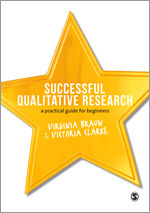Successful Qualitative Research
A Practical Guide for Beginners
- Virginia Braun - University of Auckland, New Zealand
- Victoria Clarke - University of the West of England, UK
*Winner of the 2014 Distinguished Publication Award (DPA) from the Association for Women in Psychology (AWP)*
Successful Qualitative Research: A Practical Guide for Beginners is an accessible, practical textbook. It sidesteps detailed theoretical discussion in favor of providing a comprehensive overview of strategic tips and skills for starting and completing successful qualitative research.
Uniquely, the authors provide a "patterns framework" to qualitative data analysis in this book, also known as "thematic analysis." The authors walk students through a basic thematic approach, and compare and contrast this with other approaches. This discussion of commonalities, explaining why and when each method should be used, and in the context of looking at patterns, will provide students with complete confidence for their qualitative research journey.
This textbook will be an essential textbook for undergraduates and postgraduates taking a course in qualitative research or using qualitative approaches in a research project.
Supplements
Information for Mac users
These online resources are not compatible with Safari, please use Google Chrome or another preferred browser to access them.
This is a great text that I now recommend to students.
This text provides learners the opportunity to develop further their understanding and practice of qualitative research, with useful hints and tips to enable them to apply practice across a range of projects. The practical advice is invalid and useful as an indicator in seminars and tutorials
A great practical guide for students studying Qualitative methodology
Although this book has an exceptionaly clear layout and the language used is clear an non technical, for the purposes of this course it is not the most suitable book to recommend to research students.
A worthwhile addition to market. The book is well considered with the 10 fundamentals being a particularly good chapter. The chapter summaries work well and the examples are very helpful. The copious amount of personal information about the authors is interesting but does not necessarily enhance the quality of the book.
Very comprehensive. A great source of information.
Virginia Braun and Victoria Clark have produced an excellent and informative basic textbook in response to their highly successful and well-cited 2006 article 'Using thematic analysis in psychology'. Many psychology and social science students, along with their tutors and supervisors will be delighted to find such a clear introduction to qualitative research methods. As a 'practical guide for beginners' this provides a simple but systematic description of the process of qualitative research. Starting with basic paradigms and some key theories the book progresses to research design using a range of typical qualitative methods including grounded theory (discussed as a theory and a method). There are clear instructions on how to design and conduct data collection, with examples and descriptions of a range of analysis techniques. Unsurprisingly, given this is written to some extent with psychology students in mind, particular attention is given to interpretative phenomenological analysis (IPA); there are also clear descriptions and discussion about why and how to apply other analytic approaches such as thematic, Foucauldian discourse, conversation and narrative. At each stage key concepts and terms are succinctly defined. A set of questions are provided at the end of every chapter as prompts for classroom exercises or self-study, together with a list of relevant text and web-based resources. This book will not necessarily appeal to advanced students of qualitative research or for researchers who are well-versed in the methodology and seeking in depth theoretical debate. There is also not much enthusiasm for using computer assisted software for qualitative data analysis (CAQDAS), but Braun and Clark make it clear they have a fairly neutral stance to computer software preferring, with some good reason, the low tech approach. But this textbook is a most welcome addition to other basic texts in qualitative research. I would happily recommend it as a key introductory text for undergraduates as well as postgraduate students at Masters and Doctoral level.
A good book on qualitative research written in very plain language which does not confuse or put people off research. The detail is sufficient to be able to undertake research past doctoral research studies.
This is a useful introductory book to doing qualitative research, written in an accessible and engaging way. It covers a range of pertinant topics inlcuding the importance of the researcher's philosophical position and the impact of this in directing research. The use of the same data set to illustrate differences across analytical approaches is a particualry useful approach for those new to qualitative research. This will be a valuable resource for undergraduate students to consult.
A fresh introduction to qualitative research. It will of particular use to novice researchers, but more seasoned practitioners will find the worked examples and the comparisons between different methods of great use.











